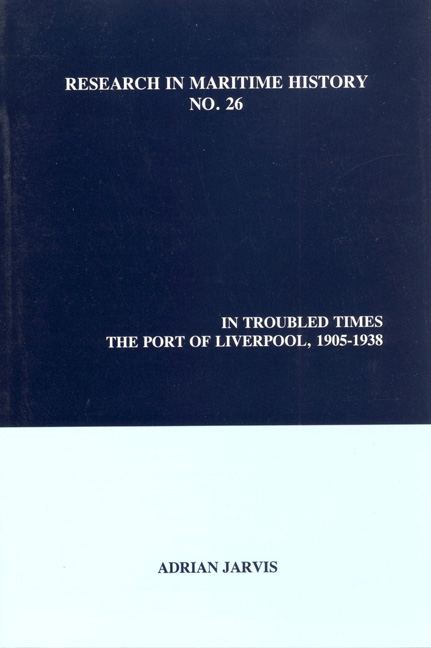Book contents
- Frontmatter
- Table of Contents
- List of Figures
- Foreword and Acknowledgements
- Conversion Factors for Imperial Measurements
- Introduction: The Port of Liverpool in 1905
- Chapter 1 The Port and Its Trade in 1905
- Chapter 2 Gladstone Dock
- Chapter 3 Not Before Time: The Board Keeps its Promise
- Chapter 4 Engineering, Management and Decision-making
- Chapter 5 Making the Customers Happy
- Chapter 6 Sand, Silt and Sewage: The Work of the Board's Dredgers
- Chapter 7 The Provision of Specialist Cargo Facilities
- Chapter 8 Into the Modern World?
- Conclusion: On the Eve of War
- Appendix: Port Efficiency: A Short Methodological Discourse
- A Note on Sources: Abbreviations
- Bibliography
- Index
Chapter 8 - Into the Modern World?
- Frontmatter
- Table of Contents
- List of Figures
- Foreword and Acknowledgements
- Conversion Factors for Imperial Measurements
- Introduction: The Port of Liverpool in 1905
- Chapter 1 The Port and Its Trade in 1905
- Chapter 2 Gladstone Dock
- Chapter 3 Not Before Time: The Board Keeps its Promise
- Chapter 4 Engineering, Management and Decision-making
- Chapter 5 Making the Customers Happy
- Chapter 6 Sand, Silt and Sewage: The Work of the Board's Dredgers
- Chapter 7 The Provision of Specialist Cargo Facilities
- Chapter 8 Into the Modern World?
- Conclusion: On the Eve of War
- Appendix: Port Efficiency: A Short Methodological Discourse
- A Note on Sources: Abbreviations
- Bibliography
- Index
Summary
It will be recalled that in 1890 the Board appointed a Special Committee to look into the general conduct of its business. In some respects this can be seen as one of a series of enquiries which set out to simplify over-complex and ineffective administrative procedures which were correctly perceived as unnecessary additions to operating costs. Its enquiries went further than that, however, and considerable attention was paid to the quality of service the Board offered its customers.
Prior to this enquiry, the Board had been becoming increasingly conservative in its policymaking and increasingly self-satisfied. With the occasional glitch, tonnages and revenue kept rising, and the rise was as marked in the higher-value trades like premium cargo-liner services as in the lower-value ones. The decline which occurred in Liverpool's share of the whole port services market was mostly due to a relative decline in low-value trades, notably coal exports, and hence of less significance to the port's real position than might at first appear. Even the Board's enormous capital debt could become a source of perverse pride, for there were not many organisations to which individual investors would lend £18,951,678, which was the total authorised borrowing of the Board in 1890, marking another reason why the Board could consider itself, if not an unique institution then at least a very special one. The previous year G.F. Lyster had read a paper on the recently-completed dock extension programme at the Institution of Civil Engineers, and it is clear that even that gathering of big spenders was impressed with the scale of Lyster's work and the funding available to him. The programme was indeed a huge one, whose size alone might justify some measure of pride on the part of the members.
It was, however, already becoming clear to some members that those works, only finally completed in 1888, had been based on a serious underestimate of the depth of water needed to keep the port competitive in those trades using the largest ships, particularly those on the North Atlantic, which had been Liverpool's most important trading area for many generations. But the Board was a body in which the Chairman received enormous respect and correspondingly wielded great power, and between 1876 and 1889 the man who wielded it was Thomas Hornby.
- Type
- Chapter
- Information
- In Troubled TimesThe Port of Liverpool, 1905-1938, pp. 187 - 204Publisher: Liverpool University PressPrint publication year: 2003



